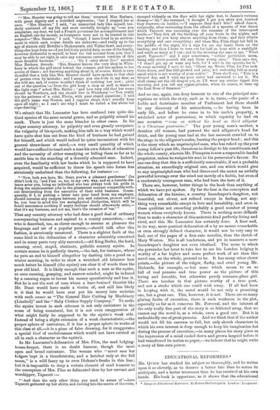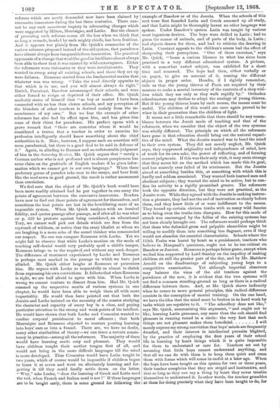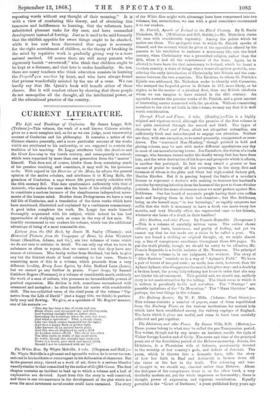EDUCATIONAL REFORMERS.*
Mn. QUICK has studied his subject so thoroughly, and he writes upon it so cleverly, as to deserve a better fate than he seems to anticipate, and a better treatment than he has received at his own hands. His book is opportune, as it shows that the educational • Euays on Educational Reformers. By Robert Ilerbert Quick. London : Longman.
reforms which are newly demanded now have been claimed by successive innovators during the last three centuries. There can- not be any such monstrous impiety in advocating changes which were suggested by Milton, Montaigne, and Locke. But the chance of procuring such reforms seems all the less when we think that so long a crusade, headel by such mighty chiefs, has been fruitless. And it appears too plainly from Mr. Quick's summaries of the various schemes proposed instead of the old system, that paradoxes have almost always been inseparable from innovation. The practical opponents of a change that would be good in itself have almost always been able to show that it was tainted by wild extravagance. Either the reformers were visionaries or they were revolutionists. They wanted to sweep away all existing schools, and those they set up were failures. Rousseau started from the fundamental maxim that whatever was was wrong. Take the road directly opposite to that which is in use, and you will almost always do right."
Ratich, Pestalozzi, Basedow mismanaged their schools, and were either forced to resign or deprived of their office. Mr. Quick modestly states of himself that "as boy or master I have been connected with no less than eleven schools, and my perception of the blunders of other teachers is derived mainly from the re- membrance of my own." But we fear the example of other reformers has also had its effect upon him, and has given him some of their thirst for paradoxes. His preface opens with a grave remark that "there are countries where it would be considered a truism that a teacher in order to exercise his profession intelligently should know something about the chief authorities in it. Here, however, I suppose such an assertion will seem paradoxical, but there is a good deal to be said in defence of
it." Again, in alluding to Rautner and an unfavourable judgment of him in the Saturday Review, Mr. Quick argues that " surely a
German author who is not profound and is almost perspicuous has seine claim on the gratitude of English readers if he gives infor- mation which we cannot get in our own language." When these prefatory germs of paradox take root in the essays, and bear fruit like the seed sown in good ground, the result is rather amusement than conviction.
We feel sure that the object of Mr. Quick's book would have been more readily attained had he put together in one essay the points of agreement between the successive innovators. Readers have now to find out these points of agreement for themselves, and sometimes the best points are lost in the bewildering maze of an impossible system. When Mr. Quick analyzes with an ironical fidelity, and quotes passage after passage, as if after all he was what on p. 220 he protests against being considered, an educational Tory, we cannot well pick out details which are free from the reproach of wildness, or notice that the crazy idealist at whom we are laughing is a mere echo of the sound thinker who commanded our respect. No one can compare Rousseau with Locke. Yet we might fail to observe that while Locke's maxims on the mode of teaching self-denial would very probably spoil a child's temper, Rousseau brings us to the required end without any such danger.
The difference of treatment experienced by Locke and Rousseau is perhaps most marked in the passage to which we have just alluded. Mr. Quick either laughs at Rousseau or patronizes him. He argues with Locke so respectfully as almost to shrink from expressing his own convictions. It follows that when Rousseau is right, we are half afraid to agree with him. When Locke is wrong we cannot venture to dissent from him. Had Mr. Quick summed up the respective merits of various systems in one chapter, he would have been able to weigh them all with more impartiality. He would then have pointed out that both the Jesuits and Locke insisted on the necessity of the master studying the character and capacity of every boy in a class, and paying particular attention to the strong and weak points of his intellect. He would have shown that both Locke and Comenius wanted to confine corporal punishment to moral offences ; that both Montaigne and Rousseau objected to masters pouring learning into boys' ears as into a funnel. There are, we have no doubt, many other similarities of theory—we can trace a certain consis- tency in practice—among all the reformers. The majority of them would have learning made easy and pleasant. They would have children taught their mother tongue first of all, and would not bring in the more difficult languages till the mind is more developed.. Thus Comenius would have Latin taught in two years, which of course would be impossible if children began to learn it at seven and went on alternately learning and for- getting it till they could finally settle down on the latter. " Why," asks Locke, " does the learning of Greek and Latin need the rod, when French and Italian need it not ?" If these languages are to be taught early, there is some ground for following the example of Basedow or of the Jesuits. When the schools of this sect were first founded Latin and Greek summed up all study, and that Latin might be thoroughly learnt no other language was spoken. Under Busedow's system Latin was taught by various most ingenious devices. The boys were drilled in Latin ; had to- guess the names of animals, and of parts of the body, in Latin ; had objects drawn for them, and had to criticize the drawing in Latin. Constant appeals to the children's senses had the effect of sharpening their perceptions. " One of these exercises," says Mr. Quick, " bears a curious likeness to what has since been practised in a very different educational system. A picture, with a somewhat varied subject, was exhibited for a short time and removed. The boys had then, either verbally or on paper, to give an account of it, naming the different objects in proper order. Houdin, if I rightly remember, tells us that the young thieves of Paris are required by their masters to make a mental inventory of the contents of a shop win- dow which they see only as they walk rapidly by." Orthodox schoolmasters may decline to adopt the analogy of young thieves. But if the young thieves learn by such means, the means must be useful. The children of this world are once again proved to be- wiser in their generation than the children of light.
It seems not a little remarkable that there should be any resem- blance between the Jesuit mode of teaching and that of the reformers, when we consider that the object of the two systems was wholly different. The principle on which all the reformers have gone is that education should bring out the natural capaci- ties of the mind. What the Jesuits wanted was to bend the mind to their own system. They did not merely neglect, Mr. Quick says, they suppressed originality and independence of mind, love of truth for its own sake, the power of reflecting, and of forming correct judgments. If this was their only wish, it may seem strange that they never hit on the method which has made this its goal,. and has scarcely ever failed of its attainment. But the Jesuits aimed at something besides this, at something with which this is hardly and seldom associated. They wanted both learned men and obedient subjects ; they wanted the mind to be active, but to con- fine its activity to a rigidly prescribed groove. The reformers took the opposite direction, but they were not practical, as the Jesuits were. While they agreed with the Jesuits in making instruc- tion a pleasure, they had not the end of instruction as clearly before them, and they knew little of or were indifferent to the means. They bound up certain obvious truths with so many wild fancies as to bring even the truths into disrepute. How far this mode of attack was encouraged by the follies of the existing systems has not been clearly brought out. The reformers would perhaps think that those who defended gross and palpable absurdities might be willing to modify them into something less flagrant, even if they would not abandon the essential characteristic. Schools where the 119th Psalm was learnt by heart as a punishment, teachers who believe in Mangnall's questions, ought not to be too critical on Basedow or Jacotot. Rousseau is perhaps fairer game, except when we find him supported by Lord Stanley on the impolicy of making children sit still the greater part of the day, and by Mr. Matthew Arnold on the disadvantage of subjecting young boys to a competitive examination. Yet although impartial observers may balance the vices of the old teachers against the paradoxes of the new, it is evident that the two systems will not find a common standing-ground so long as there is a radical difference between them. And, as Mr. Quick shows indirectly when he comes to more general principles, this radical difference consists in the conception of mental training. On the one hand, we have the idea that the mind must be broken in to hard work by tasks which are repulsive to it. " The schoolboy does not like," says Mr. Quick, summarizing this argument, " and ought not to like, learning Latin grammar, any more than the colt should find pleasure in running round in a circle : the very fact that such things are not pleasant makes them beneficial I will merely express my strong conviction that boys' minds are frequently dwarfed, and their interest in intellectual pursuits blighted, by the practice of employing the first years of their school life in learning by heart things which it is quite impossible for them to understand or care for. Teachers set out by assuming that little boys cannot understand anything, and that all we can do with them is to keep them quiet and cram them with forms which will come in useful at a later age. When the boys have been taught on this system for two or three years, their teacher complains that they are stupid and inattentive, and that so long as they can say a thing by heart they never trouble themselves to understand it. In other words, the teacher grumbles at them for doing precisely what they have been taught to do, for repeating words without any thought of their meaning." It is with a view of combating this theory, and of obviating this tameness and indifference to learning, that the reformers have substituted pleasant tasks for dry ones, and have counselled development instead of forcing. Just as it used to be said formerly that the childish appetite for sweet things ought to be checked, while it has now been discovered that sugar is necessary for the right nourishment of children, so the theory of breaking in the mind by repulsive work is gradually giving way to a more natural method. Of course there are still many parents who rigorously banish " sweetstuff," who think that children ought to be kept at a distance, and that love is undue familiarity. So, too, there are many teachers who think education consists in learning the Propria. gum maribus by heart, and who have always found that process wonderfully assisted by the use of a cane. We can hardly say that Mr. Quick's book will benefit either of these classes. But it will comfort others by showing that these people do not monopolize all the thought, all the intellectual power, or all the educational practice of the country.
































 Previous page
Previous page